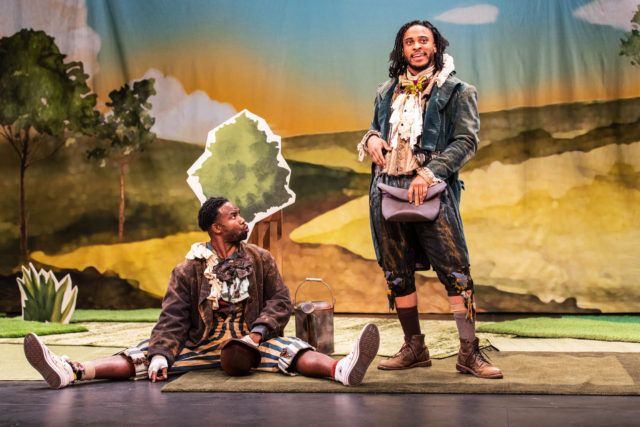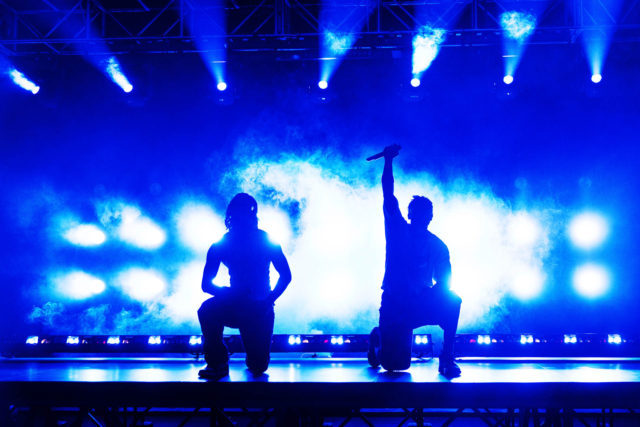
Tambo (W. Tré Davis) and Bones (Tyler Fauntleroy) channel Didi and Gogo from Waiting for Godot in new David Harris play (photo by Marc J. Franklin)
TAMBO & BONES
Playwrights Horizons, Mainstage Theater
416 West 42nd St. between Ninth & Tenth Aves.
Tuesday – Sunday through February 27, $30-$54
www.playwrightshorizons.org
In the past few years, several shows by Black playwrights have shattered the fourth wall in unique ways, challenging their majority white audiences by separating the line between fact and fiction, audience and performer. Two such examples are Jordan E. Cooper’s Ain’t No Mo’ and Jackie Sibblies Drury’s Pulitzer Prize–winning Fairview, both of which included participatory elements that placed systemic racism front and center while understanding precisely where their bread was buttered, balancing humor with recrimination.
David Harris’s new show, Tambo & Bones, which opened tonight at Playwrights Horizons, turns the tables on Black trauma porn in similar ways, incorporating Afrofuturism in its self-referential exploration of the past, present, and future of Black performers entertaining white audiences. Aggressively directed by Taylor Reynolds with a razor-sharp sense of wit and whimsy, the show, divided into three sections, expands on the concepts of minstrelsy — what Harris, who was a popular spoken word poet, refers to as “Black performative capitalism” — and freedom in different, not-always-obvious forms while scrutinizing what is real (life), what is fake (theater), and how they intertwine.
As Harris contends in his Playwright’s Perspective program note, “The most fun part about writing is that every writer I know is a fucking liar. Some think this is radical political work. Some think writing is to channel the ancestors and the woo-woos to put voice to page. But all of this is just tactic. This was the realization that made me stop doing poetry slams and start to focus on theater. I wasn’t growing as an artist; I was growing as someone who could perform identity. Spoken word capitalizes on an idea of the authentic identity. The real person. But here, in this theater, all of us know that every second of this experience is fake. And there is infinite possibility in that reality. And the pleasure is in the possibility.”
The play begins in a garden that looks like it was made for an elementary school musical. In his stage directions, Harris refers to it as “a fake ass pasture. Some fake ass trees and a fake ass bush. A fake ass sky with a fake ass sun. A lil bit of fake ass grass. Yo it’s fake ass pastoral out here.” Tambo (W. Tré Davis) is trying to grab a nap, moving a cardboard tree so he can relax in the shade. “It ain’t fake if I believe in it,” he says, getting to the heart of what theater is about, at least for a few hours.
But then Bones (Tyler Fauntleroy) arrives and ruins his friend’s rest by asking the audience for quarters so he can visit his son in the hospital for his birthday, all of which turn out to be lies. He also performs a lame trick with a knife to get more quarters. Tambo insists he is going about it all wrong.
“You gotta make em think. Stimulation, know what I mean?” Tambo explains. “And how do you do that?” Bones asks. Tambo replies, “You gotta deliver a treatise on race in America.” Bones: “Whaaaaaat?” Tambo: “Yup. Trendy intellectual shit.”
The scene is Harris’s reimagining of Samuel Beckett’s Waiting for Godot; both men wear old-fashioned hats and raise existential questions while waiting for something to happen. Bones is dressed in a raggedy costume that resembles Lin-Manuel Miranda’s military uniform in Hamilton, a show that used a Black and brown cast to entertain a predominantly white audience that patted themselves on the back for enjoying such a racially diverse musical about the Founding Fathers. But Tambo and Bones are not as passive as Vladimir and Estragon; instead of waiting for a mystery man to arrive, they go after the person responsible for their situation: the playwright.
“Why did this n—a write us into a minstrel show?” Tambo proclaims. “He could’ve written anything he wanted, and he chose to write this. You couldn’t give us no quarters in your show? You had to make us struggle n shit?” Bones replies, “Maybe he wanted all the quarters for himself.”

David Harris world premiere includes a hip-hop concert at Playwrights Horizons (photo by Marc J. Franklin)
In the second part, Tambo and Bones have become hip-hop superstars, covered in bling and rapping on a smoky stage with their names in lights. They blast such songs as “Started from the Cotton,” “Bootstrappin,” “Racism Is Bad,” and “Crack Rocks Crackin” as the audience, most of whom have probably never been to a live rap concert, dance in their seats, sing along, and wave their hands in the air like they just don’t care. But while Bones is reveling in their newfound wealth and success, Tambo still feels a responsibility to speak truth to power. “We here to have a mothafuckin party,” Bones shouts to the adoring crowd. Tambo adds more quietly, “And also provide commentary on some shit.”
The third section takes place four hundred years in the future — not a random number — as a seminar looks back at the legacy of Tambo and Bones and the history of race relations in America. It’s not an easy pill to swallow, reminding me of such other recent plays as Thomas Bradshaw’s 2019 revival of Southern Promises and Jeremy O. Harris’s Slave Play in how they relate to the audience.
Davis (Seared, Zooman and the Sign) and Fauntleroy (Tempest, Looking for Leroy) portray their carefully constructed stereotyped characters with a savvy appreciation of what they stand for in today’s world, paradigms of the Black experience in America, in theater and the rest of society, which tends to be not as forgiving as well-heeled off-Broadway audiences. “I’m just pondering my purpose n shit,” Bones says in the pasture. “You ain’t happy wit ya life as it is?” Tambo asks. “I read somewhere that happiness is just an illusion like sunlight,” Bones answers.
The first two sections feature stellar sets by Stephanie Osin Cohen, costumes by Dominique Fawn Hill, lighting by Amith Chandrashaker and Mextly Couzin, sound by Mikhail Fiksel, and music by Justin Ellington. The final scene is more ramshackle; it feels like Harris knew exactly what he wanted to say but is still working on how to accomplish it, resulting in a messy conclusion that still provides plenty of food for thought.
“It is not enough to demand insight and informative images of reality from the theater,” Bertolt Brecht wrote, describing what he called the alienation effect. “Our theater must stimulate a desire for understanding, a delight in changing reality. Our audience must experience not only the ways to free Prometheus, but be schooled in the very desire to free him. Theater must teach all the pleasures and joys of discovery, all the feelings of triumph associated with liberation.”
Tambo & Bones is a prime example of the alienation effect, but it comes with a fierce smackdown. By the end, you may simultaneously want to cheer wildly and cower in your seat. Harris (White History, Incendiary) and Reynolds (The Most Spectacularly Lamentable Trial of Miz Martha Washington, Plano) use form and genre to overturn expectations and confront an audience that is likely to revel in that challenge, then further contemplate what happened when they get home and think more about the show.
“Throughout my life, I’ve found myself continually in white spaces, and continually rebelling against white spaces, and continually finding that that rebellion has also led to me gaining in some way,” Harris admits in a Playwrights conversation with Reynolds. “I literally ask myself: what am I doing here besides trying to gain the currency of laughter, or the currency of someone thinking that I’m cool for writing this? Am I putting this up for an audience just because I want an audience?” Reynolds replies, “It’s awesome to hear you dig a little deeper into the play’s relationships with and to whiteness. And it’s not just that we are being held down by specific white people who have enslaved us — it’s also capitalism. The play puts capitalism on blast and I am so intrigued to see what the response will be from Playwrights Horizons audiences.”
Having now witnessed that response, I can say that it is, at the very least, intriguing. Harris’s next play, Exception to the Rule, will have its world premiere at Roundabout Underground in April. I already have my tickets.